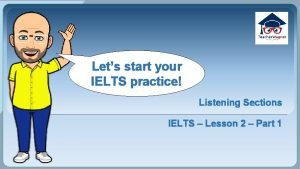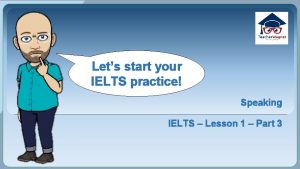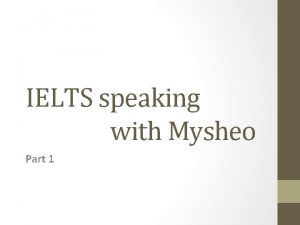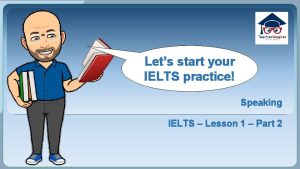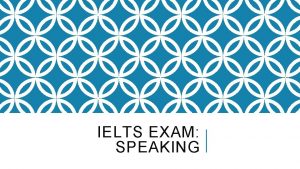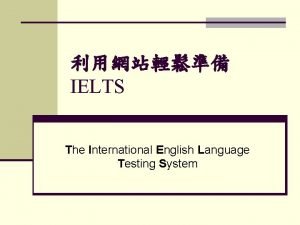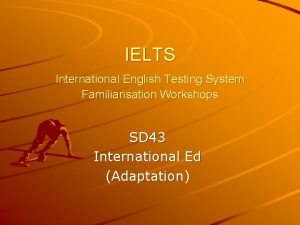IELTS WHAT IS IELTS IELTS is the International

























- Slides: 25

IELTS

WHAT IS IELTS? IELTS is the International English Language Testing System. It is the world’s number one English language test, taken by over 1 million people every year from across the world. Since 1989, IELTS has been proven and trusted worldwide to provide a secure, global, authentic and customer-focused test which is a reliable indicator of a candidate’s ability to communicate in English. IELTS has been developed by the British Council in partnership with IELTS Australia and Cambridge ESOL on the strength of forty years of research. WHY TAKE IELTS? Taking an IELTS test will help to open doors to international education and employment all over the globe. Moreover, candidates with high scores are particularly sought after by universities and employers in English-speaking countries. IELTS tests are guaranteed to show your true ability to communicate in English across all four language skills – listening, reading, writing and speaking, in a way that is relevant to the real world. Over 6, 000 institutions, including 2, 000 US universities recognise IELTS. The list of US universities includes all Ivy League Colleges. IELTS is accepted by most Australian, British, Canadian, Irish, New Zealand South African academic institutions, over 2, 000 academic institutions in the United States and various professional organisations. It is also a requirement for immigration to Australia and Canada.

Ø IELTS International English Language Testing System Listening & Reading Listening 30 MINS Reading 60 MINS Speaking and Writing Speaking 14 MINS Writing 20 MINS

Ø Listening 4 Sections, 40 items Time: 30 MINS General Training Reading 3 sections 40 items Time: 60 MINS Academic Reading 3 sections 40 items Time: 60 MINS General Training Writing Task 1 (150 words) Task 2 (250 words) Time: 60 MINS Academic Writing Task 1 (150 words) Task 2 (250 words) Time: 60 MINS Speaking Time: 11 to 14 MINS

Ø Listening Section 1 A conversation Between 2 speakers In a social context Section 2 Talk by a single Speaker based on A non academic situation Section 3 A conversation with Up to 4 speakers Based on academic topics Section 4 A university style Lecture or talk You have to answer 10 questions

Ø Reading 60 MINS Section 1 – 17 MINS Tests students on Social survival. Two or Three texts with 13 or 14 questions in 2/3 sets of different formats Section 2 – 20 MINS Two texts with 13 or 14 Questions to answer Section 3 – 23 MINS 1 text with 13 or 14 questions to answer

Ø Writing 1 hour Academic General Task 1 - 150 words 20 MINS Study bar charts, line graphs, pre charts table Task 2 – 250 words 40 MINS Write essays, reports, letters

Ø Speaking 3 sections 11 – 14 MINS Section 1 4 – 5 MINS General Introductory Question Section 2 3 – 4 MINS Monologue (1 person speaking) Section 3 4 -5 MINS Questions thematically linked to the subject in section 2

How is IELTS scored? • • • 9 Expert user 8 Very Good User 7 Good User 6 Competent user 5 Modest User 4 Limited User 3 Extremely Limited User 2 Intermittent User 1 Non User 0 Did not attempt the test

IELTS Listening sample questions • What have farmers realized about organic farming? It is more costly than conventional farming. It is more cost-effective than conventional farming. It results in lower profits than conventional farming. • In what way does organic farming benefit the environment? It does not use chemicals. It uses only synthetic materials. It can be used to control produce.

IELTS Writing sample questions • Some young children spend a great amount of their time practicing sports. Discuss the advantages and disadvantages of this. Use specific reasons. • It is sometimes said that borrowing money from a friend can harm or damage the friendship. Do you agree? Why or why not? Use reasons and examples in your answer • Every generation of people is different in important ways. How is your generation different from your parents’ generation? Use specific reasons and examples to explain your answer

IELTS Reading sample questions • • • • Multiple choice questions Short answer questions Completion questions: Completing sentences Completing a summary (no word bank) Completing a summary (with word bank) Completing a diagram Completing a flow chart Completing a table I. e. Trial Balance, Balance Sheet Matching a bank of headings to identify paragraphs or parts of text Matching a bank of writers' views/claims/information with the writer Identification of information in the text: yes/no/not given questions True/false/not given questions Matching lists/phrases Classification questions

IELTS Speaking sample questions 1) • • • Part 1 of the IELTS Speaking Module What's your name? What do you do? Where do you come from? 2) • • Part 2 of the IELTS Speaking Module Tell me about an important event in your life. Follow-up question. Do you prefer celebrating family occasions at home or in a cafe? Why? 3) • • Part 3 of the IELTS Speaking Module Is it important to celebrate different events in our lives? Are you a goal-settler? Why?

TIPS – Listening • • • • Listen to the invigilator’s instructions. Fill out the answer sheet as instructed The invigilator will check the recording before starting the listening test Do not open the question paper until instructed to do so Listen carefully to the tape and don’t let your attention wander. The tape will be played once only Be sure to read the instructions as well as the questions, carefully and follow them Be aware of the questions that follow the one you are expecting Always keep listening for clarification or a change of mind Write your answers in the question booklet quickly and clearly to be able to transfer them to the answer sheet After each section you will be given a chance to check your answers After the final section you will be told that you have 10 minutes to transfer your answers to the answer sheet Make sure you transfer your answers to the correct number on the answer sheet 10 MINS is sufficient time to transfer your answers as long as you don’t waste time Once you have transferred the answers to all questions you managed to answer, review those questions you were unable to answer

TIPS – Reading • • • Don’t spend too long on a single question Leave any questions that you have spent too long on and then come back at the end of the test if you have time Read questions and so you don’t make a silly mistake If the question asks for one answer then give one answer If the question asks for no more than 3 words, use no more than 3 words Good grammar and spelling are important Time management is an important thing to be aware of – you have a number of texts to read and 40 questions to answer in 1 hour Don’t spend too long on a difficult answer but also keep an eye on the clock Remember the test gets more difficult as it goes on so you will probably need more time for the questions at the end

TIPS – Writing • • Introduce the topic and state your stand, whether you agree or disagree. When writing about bar and line graphs, pie charts and tables, make sure you understand what the axis on the graph or the percentages in the pie chart represent. Again spend time preparing yourself before you begin writing. Give arguments in support of your viewpoint supported by relevant examples. State the contrary viewpoint and give reasons why you don't agree with it. There will usually be too much information for you to describe every detail, so you will need to focus on the key information (Trends). Conclude with a short concluding paragraph. If there is time left at the end, revise your answers and correct any spelling or grammatical mistakes.

Tips - Speaking • • Unless your pronunciation is particularly poor, don't waste time on pronunciation lessons concentrate more on vocabulary and sentence structures. Speak as much as you can, give the assessor as much as possible to consider. • Remember the assessor won't prompt you to speak. If you continue not to say enough, the interview could be very short and scores, very low. • Don't ask the assessor what questions mean. All he/she can do if you don't understand is repeat the question. You can though ask the examiner to repeat a question if you are not sure you understood it. • One of the things you must do in both phases of the speaking test is show a range of grammar structures. • Speak until they stop you, don’t just answer the question and stop. Display your best English.

End of Presentation







 Thế nào là hệ số cao nhất
Thế nào là hệ số cao nhất Diễn thế sinh thái là
Diễn thế sinh thái là đại từ thay thế
đại từ thay thế Vẽ hình chiếu vuông góc của vật thể sau
Vẽ hình chiếu vuông góc của vật thể sau Slidetodoc
Slidetodoc Thế nào là mạng điện lắp đặt kiểu nổi
Thế nào là mạng điện lắp đặt kiểu nổi Mật thư tọa độ 5x5
Mật thư tọa độ 5x5 Lời thề hippocrates
Lời thề hippocrates Vẽ hình chiếu đứng bằng cạnh của vật thể
Vẽ hình chiếu đứng bằng cạnh của vật thể Tư thế worms-breton
Tư thế worms-breton Quá trình desamine hóa có thể tạo ra
Quá trình desamine hóa có thể tạo ra Sự nuôi và dạy con của hổ
Sự nuôi và dạy con của hổ điện thế nghỉ
điện thế nghỉ Các châu lục và đại dương trên thế giới
Các châu lục và đại dương trên thế giới Dạng đột biến một nhiễm là
Dạng đột biến một nhiễm là Thế nào là sự mỏi cơ
Thế nào là sự mỏi cơ Bổ thể
Bổ thể Thiếu nhi thế giới liên hoan
Thiếu nhi thế giới liên hoan Làm thế nào để 102-1=99
Làm thế nào để 102-1=99 Bài hát chúa yêu trần thế alleluia
Bài hát chúa yêu trần thế alleluia Vẽ hình chiếu vuông góc của vật thể sau
Vẽ hình chiếu vuông góc của vật thể sau Một số thể thơ truyền thống
Một số thể thơ truyền thống Hệ hô hấp
Hệ hô hấp Tư thế ngồi viết
Tư thế ngồi viết Cong thức tính động năng
Cong thức tính động năng Bảng số nguyên tố lớn hơn 1000
Bảng số nguyên tố lớn hơn 1000




























